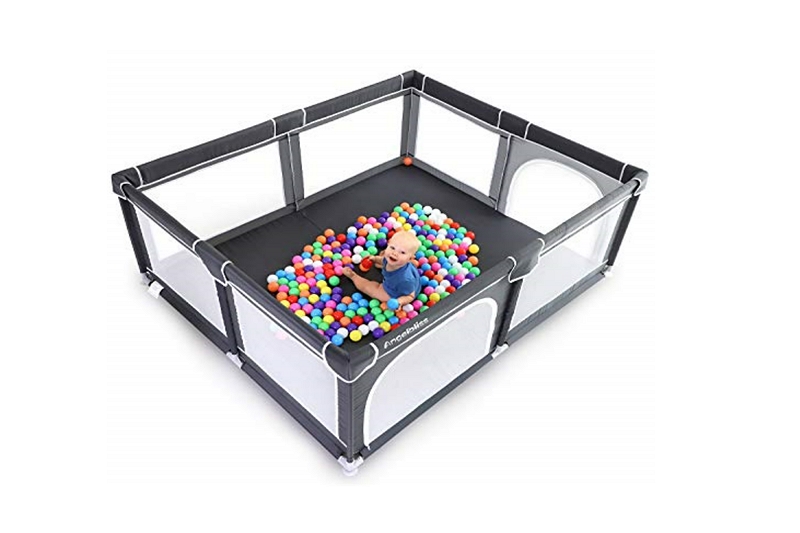When to use playpen for baby? This is a question that many parents ask, and the answer may vary depending on the individual family.
Some parents find that they need to use a playpen for their baby when he or she is very young, while others only use one when their child starts to become mobile.

Here are some general guidelines to help you decide if you need a playpen for your little one:
-If your baby is younger than four months old, it’s generally recommended that you keep him or her in a safe environment like a bassinet or crib. A playpen can be used as an alternative if you’re worried about your baby rolling out of bed, but it’s important to note that babies should not be left alone in a playpen.
-If your baby is between four months and one year old, you can still use the playpen as you did when he or she was younger; however, it’s important to make sure that there are no gaps large enough for your child to crawl through.
At this age, it’s also recommended that parents take precautions against falling down the stairs while carrying their little one (i.e., using a safety gate at the top of the stairs).
-Letting your baby sleep with other children until he or she is around three years old may increase his risk of developing asthma, so it’s best if they have their sleeping environment during naps and nighttime hours. A playpen can be a great way to provide this space.
-If your child is mobile (crawling or walking), it’s important to use a playpen to keep them safe. Crawling children are curious by nature and may explore areas that aren’t safe for them, such as the kitchen or bathroom. A playpen will help prevent accidental injuries while also keeping your child within eyesight.
Ultimately, the decision of whether or not to use a playpen for your baby is up to you and your family. These guidelines should give you a good idea of when one might be necessary, but always listen to your intuition and follow any other safety precautions that your paediatrician may recommend.
How often should you play with your baby?
Playing with your baby is a great way to connect and form a strong bond. It’s also important for your baby’s development. But how often should you play with your baby?
Experts recommend playing with your baby every day. This doesn’t mean you have to spend hours on end playing games or taking walks; even five or ten minutes of quality time can make a difference. Try to find activities that both you and your baby will enjoy, and be sure to include plenty of opportunities for interaction.
Of course, don’t forget the importance of tummy time! Babies need plenty of chances to practice crawling and rolling over, so be sure to put them on their bellies several times each day. And if your little one gets fussy, don’t worry; babies need time to complain and cry as much as they need playtime.
While it’s important not to let your baby use these sessions for attention-seeking behaviour (which can become a problem if you feed into it), sometimes all your baby needs are some extra love and snuggles before settling down again.
Chances are that once you start playing with your baby, both of you will get plenty of enjoyment out of the activity! Your bond will likely grow stronger every day, and over time those daily activities may turn into games or songs that come up frequently in conversation.
Just remember: any effort put towards nurturing this relationship now is going to pay off tenfold later on – so have fun with your little one!
How do I get my baby to play by himself?
One way to get your baby to play by himself is to provide him with age-appropriate toys that will stimulate his development. For example, you can give your baby a set of blocks to stack and build with, or a softball to toss around.
Another way to encourage independent play is to place your baby in a safe environment where he can explore without being too close to danger. A playpen or crib with colorful mobiles hanging overhead can be a great place for your baby to start playing on his own.
Finally, make sure you set aside plenty of time each day for yourself so that you can take a break and relax while your baby plays independently. This will help him learn how to amuse himself and develop self-reliance.
Why does my baby cry in the playpen?
Your baby may cry in the playpen for a variety of reasons. Some babies simply cry out of boredom, while others may be expressing their displeasure with being confined to a small space. If your baby is crying frequently or seems particularly upset in the playpen, it’s worth trying some different strategies to see if that helps calm them down.
You could try moving the playpen to a different location in the house, adding more interesting toys and activities to keep your baby occupied, or even letting your little one explore outside of the pen on occasion.
If nothing else works, you may just have to accept that your baby cries occasionally when they’re in the playpen and let them work it out themselves. Crying is a natural way for babies to communicate their feelings, and it usually doesn’t last for very long.
Remember that every baby is different, so you may have to experiment a bit to figure out what works best for your child. With a little patience and some trial and error, you’ll be able to help your baby feel comfortable in the playpen and get more enjoyment out of this important learning tool.
